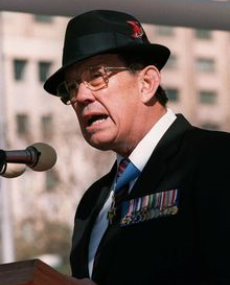
Magnus Malan was born in Pretoria on 30 January 1930. His father, Avril Ire de Merindol, was a professor of biochemistry at the university of Pretoria, and later a member of parliament and speaker of the House of Assembly, and his mother was Elizabeth Frederika Malan. He studied at the University of Stellenbosch (but did not graduate) and the university of Pretoria. From a young age, he had aspirations to join the military and in 1973 he was appointed as chief of the South African Army. Then in 1976, he was also made chief of the South African Defense Force, becoming the youngest man to hold both positions. In 1980 he became the Defence Minister in the National Party government of P.W. Botha.
During his time in government, Malan garnered a reputation for being a military technocrat, who was unafraid to quash political dissent with violence. He famously viewed domestic and foreign threats to white rule in South Africa as a “total onslaught” that could only be answered with a “total solution.” Political rights, Malan claimed, were not a relevant concern among the black masses.
During his tenure, Malan also oversaw the running of the Civil Co-operation Bureau (known as CCB), which was implicated in numerous civilian murders, including the assassination of two prominent anti-apartheid activists, David Webster and Anton Lubowski. Outside South Africa, he deployed troops on bloody raids against African National Congress bases in Lesotho, Mozambique, Zambia and Zimbabwe. He also stationed troops in Angola to fight alongside Unita rebels against Cuban troops aligned with the government in Luanda.
Malan left office in 1991, following a scandal involving secret government funding to the Inkatha Freedom Party and other opponents of the African National Congress.
In 1995, he was charged together with other former senior military officers for murdering 13 people (including seven children) in January 1987 at the home of Victor Ntuli, an ANC activist, in his house in KwaMakhuta township, near Durban. It was alleged that General Malan and his co-defendants supported a covert unit which trained the Inkhata members who carried out the attack.
In 1997, General Malan volunteered to testify before the Truth and Reconciliation Commission, which investigated atrocities in the country’s past. During this trial, he accepted responsibility for the cross-border counterinsurgencies and for setting up the secret police agency, and for the deaths they caused, but he characterized the actions as “legal acts of state.” The commission condemned General Malan and other top government leaders for using words like “eliminate,” “take out” and “wipe out,” a predilection that it said led to the killing of political opponents. It also condemned the assassination teams. However, upon passing these findings on to prosecutors, it was decided that for reasons of “national interest,” the case should be dropped. After being released on bail ranging from $800 to $2 700, all of the accused were eventually acquitted. Aside from his testimony to the state during the TRC, Malan declined to express remorse for his actions in his biography, published in 2006.
Malan died at his home in Cape Town on July 18th 2011.